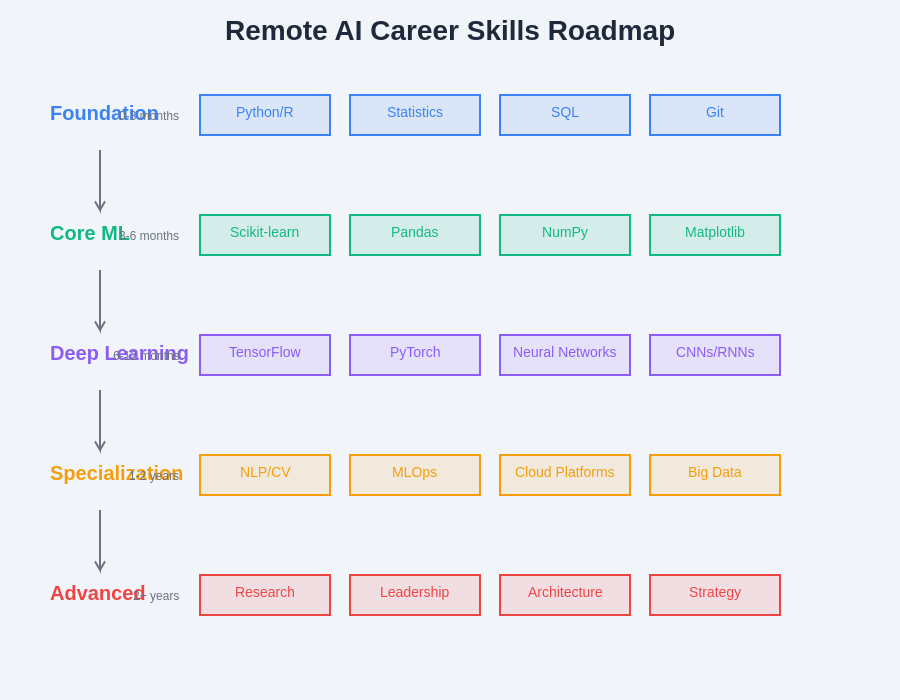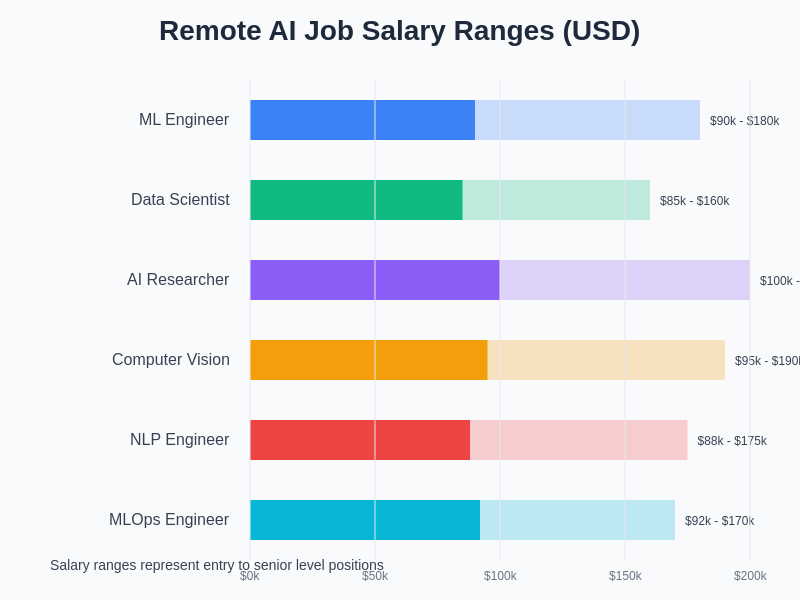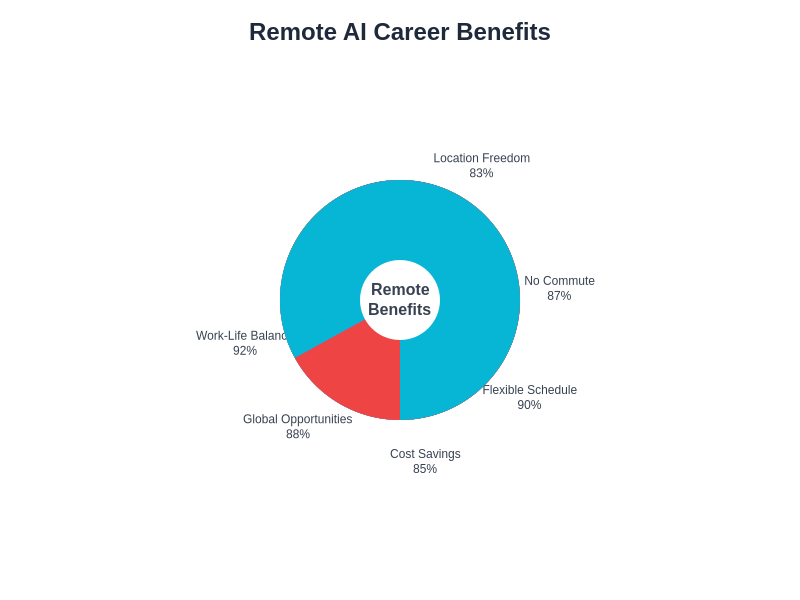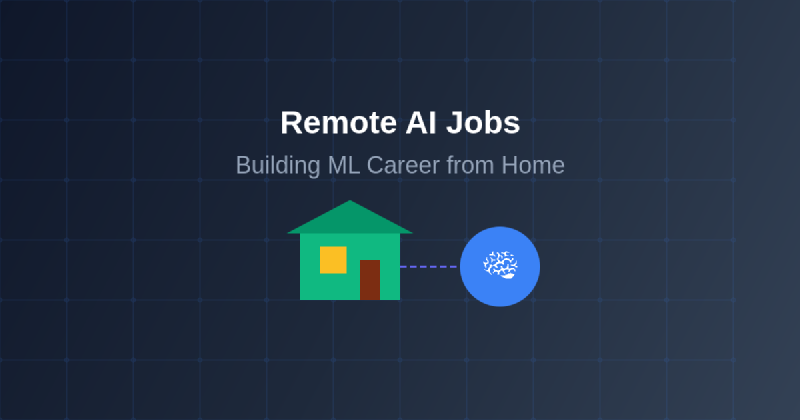The artificial intelligence revolution has fundamentally transformed the landscape of professional opportunities, creating an unprecedented demand for skilled practitioners who can harness the power of machine learning, deep learning, and advanced analytics. This transformation has been particularly pronounced in the realm of remote work, where geographical boundaries have dissolved to reveal a global marketplace hungry for AI expertise. The convergence of technological advancement and remote work culture has created a unique environment where talented individuals can build thriving machine learning careers from the comfort of their homes while contributing to cutting-edge projects that shape the future of technology and business innovation.
Explore the latest AI career trends and opportunities to stay informed about emerging roles and industry developments that are defining the future of artificial intelligence careers. The remote AI job market represents one of the fastest-growing segments of the technology industry, offering unprecedented flexibility, competitive compensation, and the opportunity to work on transformative projects that impact millions of users worldwide.
The Remote AI Revolution
The shift toward remote artificial intelligence work has been accelerated by several convergent factors that have fundamentally altered how organizations approach talent acquisition and project execution in the AI domain. Cloud computing infrastructure has matured to the point where complex machine learning workflows can be executed entirely through remote collaboration platforms, while sophisticated development environments and collaborative tools have eliminated many of the traditional barriers that once required physical presence in corporate offices or research facilities.
This revolution extends beyond mere technological capabilities to encompass a fundamental reimagining of how AI teams collaborate, innovate, and deliver value to organizations across diverse industries. Remote AI professionals now enjoy access to global opportunities that were previously limited by geographic proximity, enabling them to work with leading companies, research institutions, and innovative startups regardless of their physical location. The democratization of AI career opportunities has created pathways for talented individuals to participate in groundbreaking projects while maintaining the lifestyle flexibility that remote work affords.
Essential Skills for Remote AI Careers
Building a successful remote machine learning career requires a carefully cultivated combination of technical expertise, soft skills, and professional competencies that enable effective collaboration in distributed team environments. The technical foundation begins with proficiency in programming languages such as Python, R, and SQL, complemented by deep understanding of machine learning frameworks including TensorFlow, PyTorch, Scikit-learn, and specialized libraries for natural language processing, computer vision, and reinforcement learning applications.
Mathematical and statistical foundations remain crucial for remote AI professionals, encompassing linear algebra, calculus, probability theory, and statistical inference methods that underpin modern machine learning algorithms. These mathematical competencies enable practitioners to understand algorithm behavior, optimize model performance, and troubleshoot complex issues that arise during model development and deployment phases. The ability to translate mathematical concepts into practical implementations becomes particularly valuable in remote environments where clear communication of technical concepts is essential for team collaboration.
Enhance your AI skills with advanced tools like Claude to develop sophisticated reasoning capabilities and improve your problem-solving approach to complex machine learning challenges. The integration of AI assistants into daily workflows has become increasingly important for remote practitioners who need efficient ways to research solutions, debug code, and explore new methodologies without immediate access to in-person mentorship.
Popular Remote AI Job Categories
The remote artificial intelligence job market encompasses a diverse array of specialized roles that cater to different aspects of the AI development lifecycle and various industry applications. Machine Learning Engineers represent one of the most sought-after categories, focusing on the design, implementation, and deployment of ML systems that can operate at scale in production environments. These professionals bridge the gap between research and practical application, ensuring that theoretical advances in machine learning translate into robust, reliable systems that deliver consistent value to end users.
Data Scientists continue to represent a cornerstone of remote AI employment, combining statistical analysis, machine learning techniques, and business acumen to extract actionable insights from complex datasets. Remote data scientists often work across multiple projects simultaneously, applying their analytical skills to solve diverse business problems ranging from customer behavior prediction to operational optimization and risk assessment. The versatility required in this role makes it particularly well-suited to remote work arrangements where professionals can leverage their broad skill set across different domains and industries.
Research Scientists in AI represent the cutting-edge of remote opportunities, focusing on advancing the theoretical foundations of artificial intelligence through original research, algorithm development, and publication of scientific findings. These positions often offer the greatest flexibility in terms of work arrangements while requiring the highest levels of technical expertise and intellectual creativity. Remote AI researchers frequently collaborate with academic institutions, contribute to open-source projects, and participate in scientific conferences that drive the field forward.
Building Your Remote AI Portfolio
Creating a compelling portfolio that demonstrates your machine learning capabilities to potential remote employers requires strategic selection and presentation of projects that showcase both technical depth and practical application. Successful remote AI portfolios typically feature a diverse range of projects that span different domains, techniques, and complexity levels, providing evidence of versatility and continuous learning that employers highly value in remote team members.
The foundation of an effective AI portfolio rests on well-documented, end-to-end projects that demonstrate the complete machine learning workflow from problem definition through data collection, preprocessing, model development, evaluation, and deployment. Each project should include comprehensive documentation that explains the business context, technical approach, challenges encountered, and solutions implemented, enabling potential employers to understand not just what you accomplished but how you approached complex problems and overcame obstacles.
Open-source contributions represent another critical component of remote AI portfolios, demonstrating your ability to collaborate with distributed teams and contribute meaningful value to community projects. Active participation in popular machine learning libraries, creation of useful tools and utilities, and contribution to documentation and educational resources all signal to employers that you possess the collaborative mindset and technical communication skills essential for remote team success.
Networking and Community Engagement
Professional networking in the remote AI community requires a strategic approach that leverages digital platforms, online communities, and virtual events to build meaningful relationships with peers, mentors, and potential employers. The distributed nature of remote AI work means that traditional networking approaches must be adapted to emphasize online presence, digital contribution, and virtual relationship building that can span geographic boundaries and time zones.
Participation in online communities such as Kaggle, GitHub, Stack Overflow, and specialized AI forums provides opportunities to demonstrate expertise, learn from others, and build recognition within the broader machine learning community. These platforms serve as both learning environments and networking opportunities where consistent, valuable contributions can lead to job opportunities, collaboration invitations, and professional mentorship relationships that support career advancement.
Leverage advanced research capabilities with Perplexity to stay informed about industry trends, research developments, and networking opportunities that can accelerate your remote AI career progression. The ability to efficiently gather and synthesize information from diverse sources has become increasingly important for remote professionals who need to stay current with rapidly evolving technologies and methodologies.

The progression from foundational skills to advanced expertise in remote AI careers follows a structured pathway that enables professionals to systematically build the competencies necessary for success in distributed machine learning teams. This roadmap provides clear milestones and time estimates for skill development at each level.
Remote Work Tools and Environment Setup
Establishing an effective remote work environment for AI and machine learning projects requires careful consideration of both hardware and software infrastructure that can support computationally intensive workloads while enabling seamless collaboration with distributed teams. The hardware foundation typically centers around a powerful workstation equipped with high-performance GPUs for deep learning tasks, sufficient RAM for large dataset manipulation, and reliable network connectivity that can handle data transfer and real-time collaboration requirements.
Cloud computing platforms have become essential tools for remote AI professionals, providing access to scalable computing resources, specialized hardware configurations, and collaborative development environments that would be prohibitively expensive to maintain locally. Familiarity with major cloud providers such as AWS, Google Cloud Platform, and Microsoft Azure, along with their AI-specific services and tools, has become a fundamental requirement for most remote AI positions.
Development environment configuration plays a crucial role in remote productivity, encompassing containerization technologies like Docker for consistent environment management, version control systems for collaborative development, and integrated development environments optimized for machine learning workflows. The ability to quickly replicate development environments, share reproducible analyses, and collaborate effectively on complex codebases becomes particularly important when working with distributed teams across different time zones and technical backgrounds.
Salary Expectations and Market Trends
The compensation landscape for remote AI positions reflects the high demand for specialized skills and the global nature of the talent market, with salaries often exceeding traditional software development roles due to the specialized expertise required and the significant business value that AI capabilities can generate. Entry-level remote machine learning positions typically command salaries ranging from $80,000 to $120,000 annually, while senior practitioners and specialists can earn well into the six-figure range, often with additional equity compensation and performance bonuses.
Geographic arbitrage represents one of the unique advantages of remote AI careers, enabling professionals to earn competitive salaries typically associated with major technology hubs while living in locations with lower costs of living. This dynamic has created opportunities for AI professionals to achieve higher standards of living while building careers with leading organizations that might otherwise require relocation to expensive metropolitan areas.
Market trends indicate continued growth in demand for remote AI talent across industries, driven by digital transformation initiatives, increased adoption of AI-powered solutions, and the proven effectiveness of distributed AI teams. Specialized roles in emerging areas such as responsible AI, AI ethics, and AI safety are commanding premium compensation as organizations recognize the importance of building trustworthy and reliable AI systems.

The compensation structure for remote AI positions reflects both the specialized nature of the skills required and the global competition for top talent. These salary ranges represent typical compensation levels across different AI specializations, with significant variation based on experience level, company size, and geographic market dynamics.
Landing Your First Remote AI Job
The job search process for remote AI positions requires a strategic approach that emphasizes both technical competency and remote work capabilities, as employers seek candidates who can deliver high-quality results while working independently in distributed team environments. Crafting an effective job search strategy begins with identifying organizations that have established remote-first cultures and demonstrated success with distributed AI teams, as these companies are more likely to provide the support and infrastructure necessary for remote AI professional success.
Resume optimization for remote AI positions should emphasize specific technical achievements, quantifiable results, and evidence of successful remote collaboration experience. Highlighting projects that required independent problem-solving, self-directed learning, and delivery of measurable business outcomes helps differentiate candidates in a competitive market where technical skills alone may not be sufficient to secure desirable positions.
Interview preparation for remote AI roles typically involves multiple stages including technical assessments, coding challenges, and behavioral interviews that evaluate both technical competency and cultural fit for remote team environments. Successful candidates often demonstrate their ability to communicate complex technical concepts clearly, show evidence of continuous learning and adaptation, and provide examples of successful collaboration in distributed team settings.
Career Advancement Strategies
Long-term career progression in remote AI requires intentional skill development, strategic positioning, and continuous adaptation to evolving technological landscapes and market demands. Advanced career paths often lead toward specialized technical roles such as Principal Machine Learning Engineer or Chief Data Scientist, management positions overseeing distributed AI teams, or entrepreneurial opportunities in AI consulting and product development.
Continuous learning represents a fundamental requirement for career advancement in the rapidly evolving AI field, encompassing both technical skill development in emerging technologies and soft skill enhancement in areas such as leadership, communication, and business strategy. Remote AI professionals who demonstrate ability to bridge technical expertise with business understanding often find the most lucrative and fulfilling career opportunities.
Building thought leadership through writing, speaking, and community contribution creates opportunities for career acceleration by establishing professional reputation and expertise recognition within the broader AI community. Remote professionals who actively share knowledge, contribute to industry discussions, and mentor others often find that these activities lead to unexpected opportunities and professional connections that accelerate career progression.
Challenges and Solutions
Remote AI work presents unique challenges that require specific strategies and solutions to ensure professional success and personal satisfaction. Technical challenges often revolve around computational resource limitations, data access and security considerations, and collaboration difficulties when working with large datasets or complex model architectures that require specialized infrastructure.
Communication challenges in remote AI teams can be particularly complex due to the technical nature of the work and the need to explain complex concepts, model behaviors, and analytical findings to diverse stakeholders who may not share the same technical background. Developing strong written and verbal communication skills, creating clear documentation practices, and establishing effective knowledge sharing protocols becomes essential for remote AI professional success.
Work-life balance considerations take on particular importance in remote AI careers, where the flexible nature of the work arrangement can lead to extended working hours, isolation from colleagues, and difficulty establishing clear boundaries between professional and personal time. Successful remote AI professionals often develop structured routines, maintain dedicated workspace environments, and actively cultivate professional relationships that provide both technical collaboration and social interaction.

The advantages of remote AI careers extend far beyond simple workplace flexibility, encompassing a comprehensive set of benefits that contribute to both professional success and personal satisfaction. These benefits represent the most valued aspects of remote work as reported by AI professionals across various specializations and experience levels.
Future Outlook and Opportunities
The future of remote AI careers appears exceptionally promising, with continued technological advancement, increasing business adoption of AI solutions, and growing acceptance of remote work arrangements creating a convergent set of factors that support sustained growth in opportunities and compensation. Emerging technologies such as federated learning, edge AI, and quantum machine learning are creating new specializations and career paths that are inherently suited to distributed development and deployment models.
The democratization of AI tools and platforms is simultaneously creating opportunities for broader participation in AI careers while raising the bar for specialized expertise that commands premium compensation. Remote AI professionals who can adapt to these changing dynamics by developing expertise in emerging areas while maintaining strong foundational skills are positioned to capitalize on the most attractive opportunities in this evolving landscape.
Industry predictions suggest that remote AI work will become increasingly normalized across all sectors, with organizations recognizing that distributed teams often deliver superior results due to access to global talent pools, reduced overhead costs, and increased employee satisfaction that translates into higher productivity and retention rates. This transformation represents a fundamental shift in how AI work is conceptualized and executed, creating unprecedented opportunities for talented individuals to build fulfilling careers while maintaining the lifestyle flexibility that remote work provides.
The intersection of artificial intelligence advancement and remote work culture represents one of the most significant professional opportunities of the current technological era, offering pathways to meaningful, well-compensated careers that contribute to transformative technological development while providing the personal freedom and flexibility that defines the modern professional landscape. Success in this domain requires dedication to continuous learning, commitment to excellence in both technical and collaborative skills, and strategic positioning within the broader AI community that recognizes and rewards expertise, innovation, and contribution to the collective advancement of artificial intelligence capabilities.
Disclaimer
This article is for informational purposes only and does not constitute career or professional advice. Career outcomes in AI and machine learning may vary significantly based on individual circumstances, market conditions, and personal effort. Readers should conduct their own research and consider consulting with career professionals when making significant career decisions. Salary ranges and job market predictions are estimates based on current market conditions and may not reflect future trends or individual experiences.
